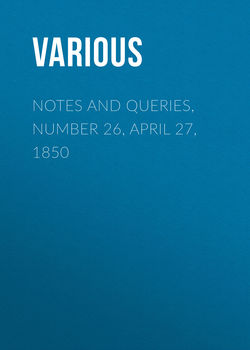Читать книгу Notes and Queries, Number 26, April 27, 1850 - Various - Страница 1
NOTES
NICHOLAS BRETON
ОглавлениеLike Mr. COLLIER (No. 23. p. 364.), I have for many years felt "a peculiar interest about Nicholas Breton," and an anxious desire to learn something more of him, not only from being a sincere lover of many of his beautiful lyrical and pastoral poems, as exhibited in England's Helicon, Davison's Poetical Rhapsodie, and other numerous works of his own, and from possessing several pieces of his which are not generally known, but also from my intimate connection with the parish in which he is supposed to have lived and died. From this latter circumstance, especially, I had been most anxious to connect his name with Norton, and have frequently cast a reverential and thoughtful eye on the simple monument which has been supposed to record his name; hoping, yet not without doubts, that some evidence would still be found which would prove it to be really that of the poet. It was therefore with the utmost pleasure that I read Mr. Collier's concluding paragraph, that he is "in possession of undoubted proof that he was the Nicholas Breton whose epitaph is on the chancel-wall of the church of Norton in Northamptonshire."
It seems strange that, notwithstanding the number and variety of his writings, the length of time he was before the public, and the estimation in which he was held by his contemporaries, so little should be known concerning Breton, and the circumstances of his life be still involved in such great obscurity. In looking over his various publications, it is remarkable how little is to be gleaned in the preliminary prefixes which relate to his own personal history, and how very rarely he touches on any thing referring to himself. There is a plaintive and melancholy strain running through many of his works, and I am inclined to the opinion entertained by Sir Egerton Bridges and others, that cares, and misfortunes, and continued disappointments had brought on melancholy and despair, and that the plaintive and touching nature of his writings were occasioned by real sorrows and sufferings. This seems at variance with his being the purchaser of the manor and lordship of Norton, and in the possession and enjoyment of this world's goods. Thus in his Auspicante Jehova Maries Exercise, 8vo. 1597, one of the rarest of his works, in the dedication to Mary, Countess of Pembroke, speaking of his temporal condition, he remarks, "I have soncke my fortune in the worlde, hauing only the light of vertue to leade my hope unto Heauen:" and signs himself "Your La. sometime unworthy Poet, and now, and ever poore Beadman, Nich. Breton." And the "Address" after it is signed, "Your poore friend or servant N.B." I am aware that these phrases are sometimes used in a figurative sense, but am disposed to think that here they are intended for something real. And I am at a loss how to reconcile these expressions of poverty with his being the purchaser and enjoyer of such an estate. I shall wait, therefore, with considerable anxiety till it may suit the pleasure or convenience of Mr. Collier to communicate to the world the proofs he has obtained of the poet's identification with the Norton monument. I would, however, further add, that so late as 1606, the Dedication to the Praise of Vertuous Ladies is dated "From my Chamber in the Blacke-Fryers," and that not one of his later productions is dated from Norton, which probably would have been the case had he been resident there.
I regret that I am unable to afford Mr. Collier any information respecting the "Crossing of Proverbs," beyond the fact of the late Mr. Rodd being the purchaser of Mr. Heber's fragment, but whether on commission or not, I cannot say, nor where it now is. The same kind of proverbs are given in Wit's Private Wealth, 1603, and in some other of his works.
Nicholas Breton, besides being a pleasing and polished writer of lyric and pastoral poetry, appears to have been a close and attentive observer of nature and manners,—abounding in wit and humour,—and a pious and religious man. He was also a soldier, a good fisherman, and a warm admirer of Queen Elizabeth, of whom he gives a beautiful character in "A Dialogue full of pithe and pleasure, upon the Dignitie or Indignitie of Man," 4to., 1603, on the reverse of Sig. c. iii.
As it is sometimes desirable to know where copies of the rarer productions of a writer are to be met with, I may state, that among some five or six-and-twenty of this author's pieces, besides the Auspicante Jehova Maries Exercise, 8vo. 1597, already mentioned, of which I know of no other copy than my own, I possess also the only one of A small handfull of Fragrant Flowers, 8vo. 1575, and A Floorish upon Fancie, 4to. 1582, both reprinted in the Heliconia; Marie Magdalen's Loue, with A Solemne Passion of the Soules Loue, 8vo. 1595, the first part in prose, the latter in six-line stanzas, and very rare; Fantastics: seruing for a Perpetual Prognostication, 4to. 1626; and Wit's Trenchmour, In a conference had betwixt a Scholler and an Angler. Written by Nich. Breton, Gentleman, 4to. bl. lett. 1597, the only copy known and not included in Lowndes's list, which, from the style of its composition and the similarity of some of the remarks, is supposed to have been the original work from which Izaac Walton first took the idea of his Complete Angler.
THOMAS CORSER.
Stand Rectory, April 16. 1850.
